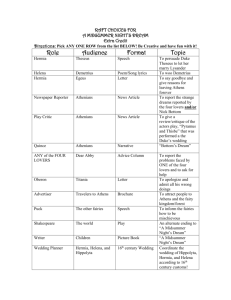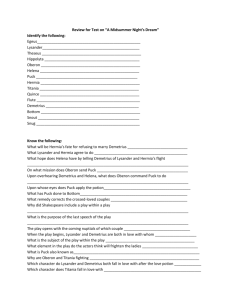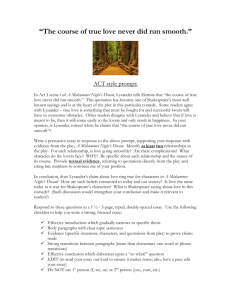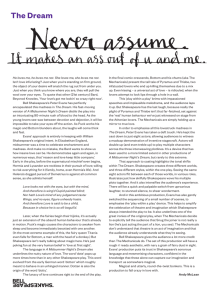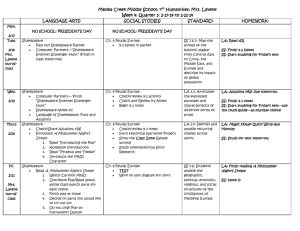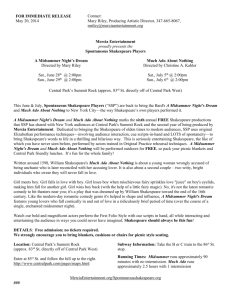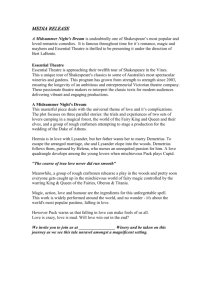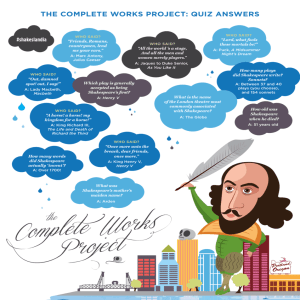Southwest Shakespeare Company - A Midsummer Night's Dream
advertisement
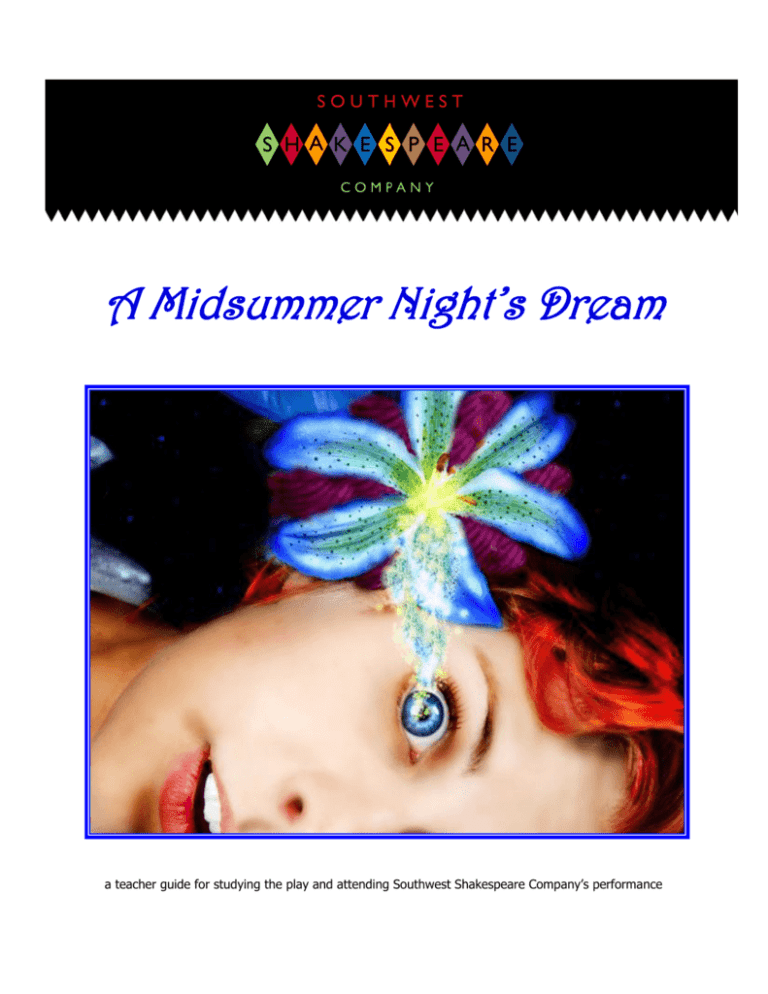
A Midsummer Night’s Dream a teacher guide for studying the play and attending Southwest Shakespeare Company‘s performance A Midsummer Night’s Dream study guide and support packet for studying the play and attending Southwest Shakespeare‘s performance. Letter to Educators ….………………………………………………………………………… 3 General Information Recommended Reading and Other Resources ………………………………….…… Meeting Arizona State Standards ………………………………………………………… 4 5 About the Play Comments from the Director ……………………….……………………………………… A Midsummer Night‘s Dream: An Introduction ……………………………………… Sources and History of the Play ….………………….…………………………………… Palladis Tamia, Wits Treasury ………………………………..…………………………… A Midsummer Night‘s Dream: A Short Synopsis …………………………………… 6 7 8 9 10 Classroom Applications Act-By-Act Writing & Discussion Topics …………………………..…………………… Writing Analysis Topics …………………………….………………………………………… Projects and Activities ………………………………………………………..……………… Scavenger Hunt ………………………………………………………………………………… Bingo …………………………………………………………………………..…………………… Enchanted Forest Beasts ……………………………………………………………….…… Create a Love Potion …………………………………………………………………….…… What Do You Think? ……………………………………………………………………….… Performing a Monologue ……………………………………………………………….…… Educator Comments…………………………………………………………………………… 11 13 14 15 16 18 19 10 21 31 ___________________________________________________________________________________________________________________________ Southwest Shakespeare Company 2011 A MIDSUMMER NIGHT‘S DREAM Study Guide Page 2 of 32 Dear Educator: Welcome to Southwest Shakespeare Company’s 17th season! We are thrilled to continue to provide quality matinee productions to Arizona’s students, and we are excited that you have chosen to bring your students to our performance of A Midsummer Night’s Dream. We appreciate that you are dedicated to bringing Shakespeare’s work alive for your students. In this age of high stakes testing, many schools and educators feel forced to limit their focus in the classroom to test-taking skills, thus eliminating enrichment activities such as attending theatrical performances. But as you know, these experiences often make the learning objectives relevant to students and must be valued as much (if not more!) as high AIMS scores and meeting AYP. You are providing your students with lasting memories and helping to create a new generation of theatre goers and lovers of Shakespeare. This experience will stay with your students long after the last bubble sheet has been marked and the latest mandate has been met. We applaud your efforts to keep the learning process memorable and meaningful for your students. We hope you find the enclosed information, activities, and resources helpful and entertaining. If you have any suggestions for activities or topics not already found in this study guide, please feel free to contact me via e-mail at education@swshakespeare.org or call me at 610.301.2233. We are always interested in hearing new ways to excite your students (and you!) about Shakespeare and live theatre. Happy teaching! Dawn Rochelle Tucker Southwest Shakespeare Company Director of Education ___________________________________________________________________________________________________________________________ Southwest Shakespeare Company 2011 A MIDSUMMER NIGHT‘S DREAM Study Guide Page 3 of 32 Recommended Reading and Other Resources Reference Books Brush Up Your Shakespeare! by Michael Macrone The Complete Idiot‘s Guide to Shakespeare by Laurie Rozakis Freeing Shakespeare‘s Voice by Kristin Linklater The Friendly Shakespeare by Norrie Epstein Shakespeare A to Z by Charles Boyce Teaching Shakespeare into the Twenty-First Century edited by Ronald E. Salomone and James E. Davis Picture Books All the World‘s A Stage by Rebecca Piatt Davidson The Bard of Avon: The Story of William Shakespeare by Diane Stanley and Peter Vennema Tales from Shakespeare by Charles and Mary Lamb Tales from Shakespeare (comic book) by Marcia Williams William Shakespeare and the Globe by Aliki Young Adult Novels King of Shadows by Sandra Cooper The Shakespeare Stealer by Gary Blackwood Shakespeare‘s Scribe by Gary Blackwood Shakespeare‘s Spy by Gary Blackwood Historical Fiction/Crime and Mystery Shakespeare and Symthe Mysteries by Simon Hawke: Mystery of Errors Slaying of the Shrew Much Ado About Murder Merchant of Vengeance Websites www.allshakespeare.com – access to scripts, study guides, lesson plans, and other resources www-tech.mit.edu/Shakespeare/works.html – the complete works of Shakespeare on-line www.folger.edu – access to primary documents and lesson plans for teaching Shakespeare shakespeare.palomar.edu/educational.htm – includes links to sites designed for teaching Shakespeare over the Internet; great for finding secondary resources to support the primary play being taught www.teachersfirst.com/shakespr.shtml – has on-line quizzes and surveys related to particular plays; also has related sites with information about Elizabethan England Script Adaptations Shakespeare Plays in the Classroom: A Midsummer Night‘s Dream retold by Alain Chirinian; Frank Schaffer Publications. Includes background information, classroom activities, and an adaptation that incorporates the play‘s original language along with modern language. ___________________________________________________________________________________________________________________________ Southwest Shakespeare Company 2011 A MIDSUMMER NIGHT‘S DREAM Study Guide Page 4 of 32 Meeting Arizona State Standards By viewing Southwest Shakespeare‘s production of A Midsummer Night‘s Dream, students can meet several of Arizona State Arts Standards. In addition, the activities included in this study guide, when implemented in the classroom, along with other teacher-assigned reading and writing activities, will allow students to meet various Arizona State Standards in Writing, Reading, Listening and Speaking, and Viewing and Presenting. Writing Standards – Strand 3: Writing Applications Concept 1: Expressive Expressive writing includes personal narratives, stories, poetry, songs, and dramatic pieces. Writing may be based on real or imagined events (Enchanted Forest Beasts, page 18). Concept 3: Functional Functional writing provides specific directions or information related to real-world tasks. This includes letters, memos, schedules, directories, signs, manuals, forms, recipes, and technical pieces for specific content areas (Create a Love Potion, page 19). Concept 5: Literary Response Literary response is the writer‘s reaction to a literary selection. The response includes the writer‘s interpretation, analysis, opinion, and/or feelings about the piece of literature and selected elements within it (Act-By-Act Writing & Discussion Topics, page 11-12; Writing Analysis Topics, page 13). Reading Standards – Strand 2: Comprehending Literary Text Concept 1: Elements of Literature Identify, analyze, and apply knowledge of the structure and elements of literature (Scavenger Hunt, page 15; What Do You Think?, page 20). Concept 2: Historical and Cultural Aspects of Literature Recognize and apply knowledge of the historical and cultural aspects of American, British, and world literature (Act-By-Act Writing & Discussion Topics, pages 11-12). Listening and Speaking Standards Standard 3: Students effectively listen and speak in situations that serve different purposes and involve a variety of audiences (Projects and Activities, page 14; Performing a Monologue, pages 21-30). Viewing and Presenting Standards Standard 4: Students use a variety of visual media and resources to gather, evaluate, and synthesize information to communicate with others (Projects and Activities, page 14). Arts Standards – Theatre Standard 2: Art in Context Students demonstrate how interrelated conditions influence and give meaning to the development and reception of thoughts, ideas, and concepts in the arts (attending and discussing Southwest Shakespeare’s performance of A Midsummer Night’s Dream). Standard 3: Art as Inquiry Students demonstrate how the arts reveal universal concepts and themes. Students reflect upon and assess the characteristics and merits of their work and the work of others (attending and discussion Southwest Shakespeare’s performance of A Midsummer Night’s Dream). ___________________________________________________________________________________________________________________________ Southwest Shakespeare Company 2011 A MIDSUMMER NIGHT‘S DREAM Study Guide Page 5 of 32 Comments from the Director These comments can be used to help you prepare your students to see the performance of a Midsummer Night‘s Dream. These comments may also answer any questions about changes or modifications made to the stage performance as compared to the written play. Name of Production: Name of Director: In what time period is this production set? Is this switched from the original text? Have any characters been cut? Have any characters been added? Have any characters been combined into one? Why did you make this choice? Is there any cross gender casting? Have any scenes been cut? Have any scenes been added? Are there fight scenes? Stage blood? Weapons? Are there love scenes? Sexual innuendo? Final Comments: A Midsummer Night‘s Dream Don Bluth 1930s. Set on a sound stage in a movie studio where movies are made. Theseus is the Studio Producer and Hyppolyta is the leading star and Philostrate is the director. Yes. No. No. No. Helps to make the message of the play clearer for the audience. Clarifying the nature of the Dream, whose dream it is, the celebration of the Imagination and Creative Process. Also points out The ridiculousness of love. The lessons we learn about falling in love. Yes. Thisbe, in the play within a play, is played by a man, but that is Shakespeare's intent. No. Some have been edited, but not fully cut. No. Yes. Minimal. No. Yes, swords. Yes, but the show is Family-Friendly. Very minimal if any. While the concept adds a layer to the play, it is not going to be distracting or distorting to Shakespeare's original point and vision of the play. It serves more to highlight the nuance of the individual characters on their path to love. ___________________________________________________________________________________________________________________________ Southwest Shakespeare Company 2011 A MIDSUMMER NIGHT‘S DREAM Study Guide Page 6 of 32 A Midsummer Night’s Dream An Introduction Considered Shakespeare‘s most successful and popular comedy, A Midsummer Night‘s Dream has something for everyone. From the elegance of the Athenian court to the lowbrow antics of the craftsmen, from passion-filled plights of the lovers to the mischievous pranks of the fairies, Midsummer is sure to please audiences of all ages. Midsummer is the most produced of Shakespeare‘s plays and, some say, is in performance somewhere in the world every week of the year. In creating this hilariously raucous, and sometimes wonderfully moving play, Shakespeare pulled from many diverse sources: merging Greek history and legends, Western European folk-lore, and his personal observation of the English country life into one tightly woven roller-coaster ride of a production. At the heart of the play are issues of love and marriage. The play‘s title harkens to a season when love classically abounds. ―Midsummer madness‖ was actually a colloquial phrase referring to someone sick with love, and the play can be seen as a celebration of love in its many forms. Shakespeare presents youthful love through his depiction of the young lovers and their adventures in the woods. We see an adult take on the issue through Duke Theseus and his captive Amazon bride-to-be, Hippolyta. Titania and Oberon represent a more matured period in love‘s longevity; a long-wed couple struggling with their less than perfect relationship. Like many of Shakespeare‘s plays, there is a drive to eliminate chaos and to restore the order of the world to its natural harmony. At the opening of the play, Hermia is forced to choose between death and marrying a man she does not love. Helena desperately seeks the love of a man who now refuses her. We shortly thereafter see Titania and Oberon feuding over the custody of a magical Indian child. Their long-standing feud, we discover, is the source of great natural disasters in the world. Through the course of the play, the already uprooted world sinks farther into disarray – often comic disarray, but disarray nonetheless. When the chaos reaches it peak, Shakespeare magically resolves the dilemmas and returns the world to a state of blissful harmony. Oberon and Titania‘s feud has ended, the young lovers are free to wed, and (as in most Elizabethan comedies), the play ends with a wedding – or, in this case, three weddings. Harmony and order has returned to the world once again. Midsummer’s Eve ―Midsummer Eve, the Vigil of St. John the Baptist, June 23, was traditionally a time of magic, when spirits supposedly walked abroad and played their tricks upon mortals. It was a time for certain traditional rites, such as the burning of bonfires, which go back to the fertility celebrations of pre-Christian Britain. By power of certain magical charms, maidens on Midsummer Eve might have dreams of who their true loves were to be. In general, the season was associated with love and marriage, and it is appropriate that Shakespeare should choose such a title for a marriage play.‖ George Lyman Kittredge, Editor What’s So Funny? Critic’s Corner ―Shakespeare uniquely took pains to work out a fairly elaborate and outrageous plot for A Midsummer Night‘s Dream. Inventing plot was not a Shakespearean gift; it was the one dramatic talent that nature had denied him. I think he prided himself on creating and intertwining the different worlds of character in the DREAM.‖ The Elizabethans had a slightly different definition of ―comedy‖ than we do today. Though often quite funny, comedies of that period Harold Bloom Shakespeare: were not always what we would consider slap-stick laugh riots. ___________________________________________________________________________________________________________________________ The Invention of the Human Sometimes, in fact, they 2011 were only slightly distinguishable fromNIGHT‘S the Southwest Shakespeare Company A MIDSUMMER DREAM Study Guide Page 7 of 32 tragedies. So, how was one to tell the difference? Quite simply, actually. Comedies ended with a marriage, while the tragedies usually ended with a death. Sources and History of the Play Scholars estimate that A Midsummer Night‘s Dream was most likely written between 1595 and 1598. Some evidence that helps to date the play is the book Palladis Tamia, Wits Treasury written in 1598 by Francis Meres in which when he praised several of Shakespeare‘s works including A Midsummer Night‘s Dream. Meres described himself as ―Maister of Arte of both Universities,‖ and he was quite favorable in his description of Shakespeare‘s writing abilities (see the next page for a copy from Palladis Tamia). Other evidence that helps to estimate the date when this play was written is found in the play itself: the lion and the wedding. The lion, which is the source of so much concern for the rustics, was probably inspired by a pamphlet published in 1594. It described a Scottish feast where plans to bring in a live lion for the evening‘s entertainment were canceled when the organizers realized that the ladies would be frightened by the beast. The wedding celebration at which most historians believe A Midsummer Night‘s Dream was first performed was that of Elizabeth Gray, goddaughter to Queen Elizabeth, in 1598, although this cannot be confirmed. The sources of A Midsummer Night‘s Dream are scattered and diverse, probably derived from various bits of literature and popular oral tradition. The love story of Theseus and Hippolyta appears in Chaucer‘s Knight‘s Tale, and various facts about Theseus can be found in Sir Thomas North‘s translation of Plutarch‘s Lives. The tale of Pyramus and Thisbe is seen in Ovid‘s Metamorphoses. The fairy lore is both traditional and literary in its sources. Tales of goblins and sprites were common enough in Elizabethan England. Indeed, Shakespeare most likely heard stories of Robin Goodfellow while growing up in Stratfordupon-Avon. Oberon, the King of the Fairies, had already appeared in Spenser‘s Faerie Queene and in other stage and literary works. Though the source for the name Titania is not clear, the other fairies (Cobweb, Moth, Mustardseed, etc.) were most likely named from Shakespeare‘s imagination. For the rustics, Shakespeare seems to have drawn from his own memory of the yokels and craftsmen he had known in Stratford, or the artisans he had observed in the byways of London. A Midsummer Night‘s Dream first appeared in print in the First Quarto, prepared from the actors‘ rehearsal scripts, which included only the individual actor‘s cues and lines. There is little difference between this printing and the play‘s appearance in the First Folio, a collection of almost all of Shakespeare‘s plays printed in 1623, seven years after the Bard‘s death. A Midsummer Night‘s Dream has had a long and interesting stage history. Its popularity in Shakespeare‘s day is not clearly known, but the title page of the First Quarto gives us an estimation. It declares that it had been ―sundry times publicly acted.‖ The play was also a favorite in the nineteenth century, when, as one reviewer excitedly stated, it was performed in London ―with real rabbits.‖ Parts of the plot have been used for ballets and operas, and the play has inspired great painters and musicians for centuries. Possibly the most well-known ―Dream-inspired‖ piece of work is Mendelssohn‘s ―Wedding March,‖ which was written in the early nineteenth century to introduce Act V of a performance of A Midsummer Night‘s Dream. It is still a popular piece of music, now most often played as a recessional at weddings. What does Arizona’s weather have in common with A Midsummer Night’s Dream? ―There is a folk belief that extreme heat is a cause of madness (hence the phrase ‗midsummer madness‘) and this is not entirely a fable. The higher the sun and the longer it beats down, the more likely one is to get sunstroke, and mild attacks of sunstroke could be conducive to all sorts of hallucinatory experiences. Midsummer, then, is the time when people are most apt to imagine fantastic experiences.‖ Isaac Asimov ___________________________________________________________________________________________________________________________ Southwest Shakespeare Company 2011 A MIDSUMMER NIGHT‘S DREAM Study Guide Page 8 of 32 Palladis Tamia, Wits Treasury Palladis Tamia, Wits Treasury is one of the most important primary documents related to Shakespeare since it sets the date before which all the plays listed were written. Meres begins by praising two of Shakespeare‘s narrative poems, Venus and Adonis and The Rape of the Lucrece as well as the Sonnets. Meres then goes on to praise Shakespeare‘s tragedies and comedies. Meres seems to have been quite a fan! A copy of Francis Meres‘ Palladis Tamia, Wits Treasury Notice the mention of A Midsummer Night‘s Dream in the first paragraph on page 282 ___________________________________________________________________________________________________________________________ Southwest Shakespeare Company 2011 A MIDSUMMER NIGHT‘S DREAM Study Guide Page 9 of 32 A Midsummer Night’s Dream: A Short Synopsis The story of A Midsummer Night‘s Dream may best be explained by dividing it into its three basic units: the Royals and Lovers, the Rustics, and the Fairies. The Royals and the Lovers As Theseus, the Duke of Athens, and Hippolyta, the Queen of the Amazons, prepare for their wedding, Egeus, a nobleman of the town, comes before them to seek assistance with his disobedient daughter, Hermia. Egeus wants her to marry Demetrius, but she wants to marry Lysander. According to the law of Athens, Hermia must marry the man her father chooses or die. Theseus acknowledges that Egeus has the law on his side, but offers Hermia the alternate choice of becoming a nun. Finding neither option very appealing, Hermia and Lysander decide to run away so that they can be married. Before they leave, they see Helena, Hermia‘s best friend, and tell her of their plans. Helena is in love with Demetrius, so in hopes of proving her loyalty to him, she tells Demetrius of Hermia‘s plan. As Lysander and Hermia travel through the woods the following night, Demetrius attempts to track them down with the unwelcome and love-sick Helena tagging along. While in the woods, fairies play tricks on the young lovers. Through magic, Demetrius and Lysander both suddenly fall madly in love with Helena. This confusion leads to a quarrel, which Oberon, King of the Fairies, stops. Oberon shortly puts the relationships as they should be; Demetrius is in love with Helena, and Lysander is in love with Hermia. When they awake the next morning, the Duke decides to allow Lysander and Hermia to marry. Demetrius, transformed by the evening in the forest, proclaims his renewed love for Helena. They joyously return to Athens where the three couples are married. The Rustics The workers of Athens have decided to perform a play for the Duke on his wedding day. Peter Quince, a local carpenter, gathers the craftsmen thought best skilled to perform the play: Nick Bottom, Francis Flute, Tom Snout, Robin Starveling, and Snug the joiner. Bottom, a weaver with great aspirations to be an actor, is cast as Pyramus, a noble young man. Flute, a young man with a high voice, is cast as Thisbe, a girl that Pyramus loves. The group decides to rehearse in the woods outside town so that they won‘t be disturbed. When they meet to rehearse, they are also subjected to fairy pranks. Puck, a very mischievous spirit, places a donkey‘s head on Bottom. This sight frightens the other craftsmen so badly that they run home to Athens, leaving Bottom alone in the forest. Titania, who has been sleeping nearby, awakes, and through a spell cast by Oberon, falls madly in love with the donkey-headed Bottom. Later, when Titania and Bottom are released from the fairy spells, Bottom believes that he has simply had a fascinating dream and rushes off to find his friends. Reunited once again, the craftsmen hurry off to the palace and perform their play for the newly married couples. The Fairies When the play begins, Titania and Oberon, Queen and King of the Fairies, are feuding because Titania refuses to give Oberon a magical child left in her care. Oberon, furious that Titania will not give him the boy, places a spell on her using a magical flower. The spell will make the Fairy Queen fall in love with the first creature that she sees when she wakes. When she awakes, the first creature she sees is Nick Bottom, a mortal on whom Puck has placed a donkey‘s head. She falls madly in love with the transformed man and orders her fairies to be courteous to her new love. Before releasing her from his spell, Oberon steals Titania‘s magical boy-child. No longer fighting, Titania and Oberon then go with the fairies to celebrate Duke Theseus‘ wedding day. ___________________________________________________________________________________________________________________________ Southwest Shakespeare Company 2011 A MIDSUMMER NIGHT‘S DREAM Study Guide Page 10 of 32 Act-By-Act Writing & Discussion Topics Act I According to Lysander, ―The course of true love never did run smooth.‖ Agree or disagree with this quote by providing supporting evidence from the play, real life, television shows, and/or movies. Helena tells her best friend‘s secret to Demetrius—that Hermia and Lysander are eloping. Was it wrong of her to do this? Write about a time you told a secret. How did you feel? Did the person whose secret you told find out? What were the consequences? Hermia takes control over her life when she refuses to marry Demetrius and runs away with Lysander. Helena, on the other hand, follows Demetrius, hoping he will return her affections after hearing of the elopement. Discuss these two women according to their decisions. Is it better to make your own fate or trust that things will eventually turn out the way you want them? What do Hermia‘s and Helena‘s actions reveal about their personalities? Hermia takes a big risk by running away with Lysander. Under Athenian law, she could be put to death by disobeying her father! Write a letter from either Hermia or Lysander to Egeus, Hermia‘s father, trying to convince him to let Hermia and Lysander marry. In the play, Demetrius had formerly ―wooed‖ Helena, and then deserted her. Can this information be used as a way to make Egeus realize that perhaps Lysander is a better match for his daughter? Act II Puck fetches the magic flower that has the power to makes someone fall in love with the first person he or she sees. What would you do with such a flower? Write the different ways you could use this flower for fun, pranks, or to heal broken hearts. Choose one scenario and write a dialogue between the lover and the recipient. ―Be it cat, or bear, or boar with bristled hair … wake when something vile is near.‖ Oberon speaks these words out of spite and jealousy as he places the ―love potion‖ on Titania‘s eyelids. How do you feel about Oberon playing this trick to get what he wants? Have you ever tried to manipulate someone to get what you wanted? How did you feel, and what were the consequences of your actions? Though it is clear that Demetrius loves Hermia and not Helena, Helena continues to pursue him. Even after Demetrius tells Helena he will leave her alone in the woods ―at the mercy of the wild beasts,‖ she still follows him. Human nature sometimes makes us want things we can‘t have. Why do you think not being able to have something makes it more desirable? Act II ends with almost all the occupants of the forest falling asleep. sequence of the play, and what does this say about the title? How does this affect the ___________________________________________________________________________________________________________________________ Southwest Shakespeare Company 2011 A MIDSUMMER NIGHT‘S DREAM Study Guide Page 11 of 32 Act III There are many stories and fairy tales of a ―beauty‖ falling in love with a handsome prince, but there are fewer stories about a ―beauty‖ falling in love with a ―beast,‖ like Titania and Bottom. Compare and contrast the first type of story to the second type. Although Titania is meant to look silly by falling in love with the ―lowly‖ mortal, is there a message in this that goes beyond the comic element? If so, what do you think it is? In order to decide who gets to be with Helena, Demetrius and Lysander challenge each other to a duel. Do you think this is a logical way to make a decision? What are its advantages? Disadvantages? What other ways could they have come to a decision? Demetrius and Lysander never stop to ask Helena whom she prefers. What does this say about the status of women in Athenian society? Which of the lovers is constant? Is this just a device for the play, or was Shakespeare making an observation about human nature? Act IV Lysander and Hermia disobey Athenian law by running away to get married. Is it ever okay to break the law? If so, under what circumstances? Were Lysander and Hermia justified in their actions? If you were a judge, would you convict them? Why or why not? Egeus is very angry with his daughter for disobeying him. Think about and write down his reasons for being angry, and then discuss whether these reasons are justified. How did the status of women during this period in Athens affect the course of women‘s lives today? How might the father/daughter relationship be different today? When Bottom awakes from his sleep, he gives a soliloquy about dreams. Why was it necessary for Shakespeare to place this here, and what is it reinforcing about the play? Act V Of the three marriages that take place as the end of the play, which do you see as being the most stable? Why? Considering the events and dialogue between these characters in the story, list the positive and negative qualities of all three marriages. The wedding guests make fun of the play The Most Lamentable Comedy, and Most Cruel Death of Pyramus and Thisby because it is melodramatic and ridiculous, yet the ―lovers‖ in Pyramus and Thisby aren‘t much more ridiculous than those in the ―audience.‖ Referring back to particular events in the story, discuss which lovers appear the funniest and why. Why do you think love makes people do funny and outrageous things? How does Puck‘s final speech reinforce the topic of illusion in the play? ___________________________________________________________________________________________________________________________ Southwest Shakespeare Company 2011 A MIDSUMMER NIGHT‘S DREAM Study Guide Page 12 of 32 Writing Analysis Topics 1. It is very simple to divide the story of A Midsummer Night‘s Dream into three separate units: the Fairies, the Royals/the Lovers, and the Rustics. As concisely as possible, recount each of their stories. How are they interrelated? When do they overlap? Why do you think Shakespeare decided to write about three very different groups in one play? What does it possibly say about his audience? Why do you think the play is still so popular today? 2. Shakespeare uses three distinctly different writing styles for his three groups. How do the groups ―sound‖ different? Consider the words and phrases that they use. Which group speaks predominately in verse? Is there a group that speaks mostly in prose? How is verse used differently by each group? Why do you think Shakespeare chose to write differently for each of the groups in A Midsummer Night‘s Dream? 3. Shakespeare titled this play A Midsummer Night‘s Dream. Some scholars argue that lines in the text suggest that the play is actually set in May. Why then do you think Shakespeare chose this title? What images are conjured when one thinks of warm evenings in the middle of summer? How is one‘s behavior different at that time of year than at other times? 4. Though they begin the play, very little time is spent focusing on Theseus and Hippolyta. Their wedding, announced in the very first line, however, becomes a framing device for the entire play. Why do you think Shakespeare chose to begin and end his play with this royal union? Does it establish or reinforce any particular theme in the play? How does the wedding of Theseus and Hippolyta tie into the stories of the rustics, the lovers, and the fairies? 5. The play is titled A Midsummer Night‘s Dream. The question then becomes: ―Whose dream?‖ Is it Bottom‘s dream? Is it Puck‘s or Titania‘s dream? Does the title refer to the lovers‘ adventures in the woods? Is the play actually the audience‘s collective dream? Support your answer. ___________________________________________________________________________________________________________________________ Southwest Shakespeare Company 2011 A MIDSUMMER NIGHT‘S DREAM Study Guide Page 13 of 32 Projects and Activities 1. THE DAILY NEWS: Imagine you are an Athenian journalist who wants to report the events of A Midsummer Night‘s Dream in your newspaper story. Apply the information given in the play to your story and design an appropriate layout for your newspaper. 2. THE EVENING NEWS WITH ________________: Write a script for a news broadcast which reports on the events in A Midsummer Night‘s Dream. Include a weather report, a missing person report, a fast-breaking story, a human-interest angle, a ―strange but true‖ feature, etc. Use at least two anchors to present the broadcast. You may videotape or perform your broadcast for the class. 3. A BUSY DAY AT THE CASTING AGENCY: A casting agency is where actors are selected to play parts in movies. Suppose you are the head of the largest casting agency in Hollywood, and a large film studio that wants to make a new movie version of A Midsummer Night‘s Dream has contracted you. Make up the casting list by deciding which roles will go to which movie or television actors. Decide during what time period your production will take place. Also, write a short synopsis on why you think each actor is ―perfect for the role.‖ 4. YOU’RE THE TALK SHOW HOST: Imagine yourself as a popular talk show host. Your producer tells you that next week you will have the characters of A Midsummer Night‘s Dream on your show. As you plan your show, consider such things as the show‘s title (for example, ―Runaway Athenian Kids‖), whom to have in the audience (Athenian teens, nobility, etc.), and your own angle on the story (Fairies and Sprites: can they be trusted?). Write a script, and act it out or videotape it for the class. 5. COMIC BOOK CREATOR: If you have a natural talent to write a comic book, or you have ever wanted to try to write a comic book, try reproducing A Midsummer Night‘s Dream as a comic. Remember that you must use the actual dialogue of the play in order to write your comic; you may edit the text, but you must use enough of the main story to keep the plot true to the story as told in the play. 6. WANTED: Create a ―wanted‖ poster for Puck, the mischievous sprite. You must include an illustrated ―photo,‖ a list of his criminal activities (mischief-making), physical description, aliases, where he was last seen, his probable whereabouts, and any rewards being offered. Who is offering the reward for his capture (think about who in the play might want to capture Puck to keep him from further mischief)? What punishment might he receive if he were captured? 7. FLOWERS FOR SALE: Create a commercial and print ad campaign for Oberon‘s magic flower, the ―Love-in-idleness.‖ You must come up with a pitch, a slogan, and one unique way to market your target audience. Who would be the most likely to buy such a product? What would be the best ways to reach this audience—radio, television, direct mail, billboards, magazines, newspapers, Internet ads? Would getting testimonials from several ―satisfied customers‖ be effective? Create your campaign and present it to the class. 8. FASHION DESIGNER: Fairy Wear is the latest fashion! Create sketches of clothes fit for Titania and Oberon, the Queen and King of the Fairies. Remember, they are the rulers of the natural world, so the clothing should have a ―natural‖ appearance. Then, plan a fashion show to unveil these designs: write a descriptive plan of the show including the brand name, the theme of the show, music used during the show, a script for the host to use to describe the fashions, etc. Then videotape the fashion show using ―live‖ models or dolls! 9. WEDDING PLANNER: Imagine that you are in charge of the wedding of Theseus and Hippolyta. There is no limitation on the budget, so you have unlimited resources. What would you plan for the wedding ceremony? The wedding reception? Prepare a detailed schedule and a budget of the event. 10. CHILDREN’S BOOK AUTHOR: Create a children‘s story about the fairies in the play. They can interact with characters from the play or with new characters that you create. Keep in mind the personality of each fairy so that they act in ways that are true to their characters. Illustrate the book with your own drawings, pictures from magazines, or from pictures you design on a computer. Create a cover that displays the title of your book, a scene from the book, and your name. Find a creative way to bind the book together! ___________________________________________________________________________________________________________________________ Southwest Shakespeare Company 2011 A MIDSUMMER NIGHT‘S DREAM Study Guide Page 14 of 32 A Midsummer Night’s Dream Scavenger Hunt Part One: Discover how your classmates‘ opinions and experiences relate to the play! Walk around the room and find a student to which each statement applies and ask him/her to initial the square. Students may initial each paper only once! The first student to complete all 25 squares wins!! Share your findings with the class and discuss the situations to which you can relate and why. ___ has played a trick on somebody ___ has “loved” someone who didn’t return the feeling ___ has felt jealousy ___ has envied a friend’s good looks ___ has had parents disapprove of a relationship ___ has tried to run away from a problem ___ believes in love at first sight ___ has fought with a friend over a boy/girl ___ regrets falling in love with someone ___ has had funny or bizarre dreams recently ___ believes that looks don’t matter when in love ___ likes to tease or mock others ___ has disobeyed a parent ___ has been annoyed by a persistent admirer ___ has had a crush on the friend of a boyfriend/ girlfriend ___ enjoys magic shows or tricks ___ has gotten completely lost ___ is sometimes fickle about love ___ has told a friend’s secret ___ has been spoiled ___ enjoys plays and shows ___ has rudely insulted a friend ___ has refused a loved one’s demands ___ likes to play “matchmaker” ___ has performed on stage Puck Part Two: In each box, list the names of characters next to the appropriate statement (the first one has been done for you). Be ready to defend your choices to the class with specific details from the play! ___________________________________________________________________________________________________________________________ Southwest Shakespeare Company 2011 A MIDSUMMER NIGHT‘S DREAM Study Guide Page 15 of 32 BINGO ___________________________________________________________________________________________________________________________ Southwest Shakespeare Company 2011 A MIDSUMMER NIGHT‘S DREAM Study Guide Page 16 of 32 Directions: In random order, write the names listed below on the grid above. Demetrius Egeus Snug Francis Flute Theseus Helena Titania Hermia Hippolyta Oberon Peter Quince Lysander Nick Bottom Snout Philostrate Puck Bingo Directions for Teachers: Use the following descriptions or quotes to test your students‘ knowledge of the characters of A Midsummer Night‘s Dream! Descriptions: 1. 2. 3. 4. 5. 6. 7. 8. 9. 10. 11. 12. 13. 14. 15. 16. wants to take the changeling child from the Fairy Queen (Oberon) falls in love with a mortal while under the spell of a love potion (Titania) the Duke of Athens (Theseus) the Queen of the Amazons (Hippolyta) says the ―Prologue‖ of the play Pyramus and Thisby (Peter Quince) plays the lead male role in the play Pyramus and Thisby (Nick Bottom) plays the lead female role in the play Pyramus and Thisby (Francis Flute) is worried about learning his lines for the play Pyramus and Thisby (Snug) plays the Wall in the play Pyramus and Thisby (Snout) asks the Duke to force his daughter to marry Demetrius (Egeus) the man Helena loves (Demetrius) the man Hermia loves (Lysander) reveals her best friend‘s secret to the man she loves (Helena) puts a love potion in the wrong man‘s eyes (Puck) runs away with her lover against her father‘s wishes (Hermia) does not think the Duke will enjoy the play Pyramus and Thisby (Philostrate) Quotes: 1. ―The course of true love never did run smooth.‖ (Lysander) 2. ―Love looks not with the eyes, but with the mind, And therefore is winged Cupid painted blind.‖ (Helena) 3. ―Bless thee, Bottom! bless thee! thou art translated.‖ (Peter Quince) 4. ―I am that merry wanderer of the night.‖ (Puck) 5. ―The villain is much lighter-heeled than I. I followed fast, but faster did he fly.‖ (Lysander) 6. ―Yet marked I where the bolt of Cupid fell. It fell upon a little western flower, Before milk-white, now purple with love‘s wound‖ (Oberon) 7. ―I have had a dream, past the wit of man to say what dream it was. Man is but an ass, if he go about to expound this dream.‖ (Nick Bottom) 8. ―The object and the pleasure of mine eye, Is only Helena.‖ (Demetrius) 9. ―I pray thee, gentle mortal, sing again: Mine ear is much enamour‘d of thy note‖ (Titania) 10. ―Nay, faith, let not me play a woman; I have a beard coming.‖ (Francis Flute) 11. ―Lovers and madmen have such seething brains …‖ (Theseus) ___________________________________________________________________________________________________________________________ Southwest Shakespeare Company 2011 A MIDSUMMER NIGHT‘S DREAM Study Guide Page 17 of 32 12. ―A play there is, my lord, some ten words long … But by ten words, my lord, it is too long.‖ (Philostrate) 13. ―… I present a wall: And such a wall, as I would have you think, that had in it a crannied hole or chink, Through which the lovers, Pyramus and Thisby, Did whisper often very secretly.‖ (Snout) 14. ―Four days will quickly steep themselves in night; Four nights will quickly dream away the time‖ (Hippolyta) 15. ―Have you the lion‘s part written? pray you, if it be, give it me, for I am slow of study.‖ (Snug) 16. ―You thief of love! what, have you come by night And stolen my love‘s heart from him?‖ (Hermia) Enchanted Forest Beasts Directions: 1. On the first line below, the first person in the group should write a descriptive sentence about an imaginary ―beast.‖ That person should write his/her initials next to his/her sentence. 2. Pass the paper to the next person in the group. 3. This person should read the description written by the first person, add one descriptive sentence about this ―beast,‖ and pass the paper to the next person, being sure to write his/her initials next to his/her sentence. 4. Follow steps 1-3 until all of the lines are filled. 5. Read the finished description aloud to the group, checking spelling and adding any details . . . and then be prepared to read your group‘s description to the class! 1. __________________________________________________________________________ 2. __________________________________________________________________________ 3. __________________________________________________________________________ 4. __________________________________________________________________________ 5. __________________________________________________________________________ 6. __________________________________________________________________________ 7. __________________________________________________________________________ ___________________________________________________________________________________________________________________________ Southwest Shakespeare Company 2011 A MIDSUMMER NIGHT‘S DREAM Study Guide Page 18 of 32 8. __________________________________________________________________________ 9. __________________________________________________________________________ 10. _________________________________________________________________________ Group Member Names: ____________________ ____________________ _____________________ ____________________ ____________________ Create a Love Potion For thousands of years, people have been searching for a love potion that really works. What do you think would be a good recipe for a ―love potion‖? That is your assignment . . . write a recipe for a love potion! Remember to use specific measurements (for example: 1 cup rose petals, 1/2 teaspoon tears, 3 candy hearts, a dash of sweetness, 2 ounces happiness, five gallons of trust, etc.) for each ingredient. Also include directions for mixing the ingredients and any other cooking/baking instructions for your perfect love potion. And don‘t forget to include how to drink, eat, or administer the love potion! Ingredients: ______________________________ ______________________________ ______________________________ ______________________________ ______________________________ ______________________________ ______________________________ ______________________________ ______________________________ ______________________________ Directions: ___________________________________________________________________________________________________________________________ Southwest Shakespeare Company 2011 A MIDSUMMER NIGHT‘S DREAM Study Guide Page 19 of 32 What Do You Think? Directions: Read each quote in the chart below. Then paraphrase the quote in your own words, and explain if you agree or disagree with the statement. Back up your opinions with an explanation from the play or your own life experiences. Quote from the Play Your Paraphrase Agree or Disagree— Why? ―The course of true love never did run smooth.‖ ―Love looks not with the eyes, but with the mind …‖ ―Man is but an ass if he go about to expound this dream.‖ ―Never anything be amiss when simpleness and duty tender it.‖ ―(Women) cannot fight for love, as men may do.‖ ___________________________________________________________________________________________________________________________ Southwest Shakespeare Company 2011 A MIDSUMMER NIGHT‘S DREAM Study Guide Page 20 of 32 ―Lord, what fools these mortals be!‖ ―As a surfeit of the sweetest things, the deepest loathing to the stomach brings.‖ Performing a Monologue Presentation skills are becoming more and more important in today‘s society. The ability to speak well, whether it is with one person or in front of a large group, is a skill that people use everyday in the world. By encouraging your students to memorize and perform a monologue written by William Shakespeare, you will be immersing them in great thoughts and language. Although your students may be initially nervous about performing in front of their classmates, you can make the experience non-threatening by participating in it yourself … you will show your students that even you can do it, and probably provide them with some good laughs! 1. Ask students to choose a monologue from the play to memorize. Each student can choose one of the provided monologues or choose another one from the play after checking with the teacher. 2. The teacher can model both effective and ineffective monologues (you can have fun with this, especially when modeling the ―ineffective‖ monologue!). Then ask students to point out which elements of the performance were successful and which were not. On the board, write down a list of bad habits that distract the audience or take away from the performance, such as fidgeting, monotone voice, inaudible volume, mispronunciations, and speaking too quickly. Then write down a list of elements that a successful performance should contain: eye contact with the audience, voice inflection, sufficient volume, evidence of understanding, pronunciation, and appropriate speed with the proper pauses. 3. Allow some time in class for students to practice their monologues. Pair students together (rotating with different partners at each practice session). Have students practice with their partners; the partners should offer constructive criticism, using the included checklist to help them make helpful suggestions. ___________________________________________________________________________________________________________________________ Southwest Shakespeare Company 2011 A MIDSUMMER NIGHT‘S DREAM Study Guide Page 21 of 32 A Midsummer Night’s Dream Monologue Performance Name: ________________________________________ Character: ________________________ The following requirements are graded on a scale of 1 to 5 (1 being lowest and 5 being highest): _____ knowledge of lines (did not miss any lines; very few awkward pauses) _____ stage presence (commands the audience‘s attention; use of eye contact; not constantly looking at the floor or shifting feet; did not stand in one spot without moving) _____ body movement (movements seem natural; no forced or unmotivated movements; movements fit the character) _____ use of voice (use of pauses; easy to hear and understand words) _____ use of space (did not stand in one spot) _____ rehearsal is obvious (actually took time to rehearse; everything flows) -------------------------------------------------------------------- A Midsummer Night’s Dream Monologue Performance Name: ________________________________________ Character: ________________________ The following requirements are graded on a scale of 1 to 5 (1 being lowest and 5 being highest): ___________________________________________________________________________________________________________________________ Southwest Shakespeare Company 2011 A MIDSUMMER NIGHT‘S DREAM Study Guide Page 22 of 32 _____ knowledge of lines (did not miss any lines; very few awkward pauses) _____ stage presence (commands the audience‘s attention; use of eye contact; not constantly looking at the floor or shifting feet; did not stand in one spot without moving) _____ body movement (movements seem natural; no forced or unmotivated movements; movements fit the character) _____ use of voice (use of pauses; easy to hear and understand words) _____ use of space (did not stand in one spot) _____ rehearsal is obvious (actually took time to rehearse; everything flows) Lysander Act III, Scene 2 Where art thou, proud Demetrius? Speak thou now. I will be with thee straight ... He goes before me and still dares me on: When I come where he calls, then he is gone. The villain is much lighter-heeled than I. I followed fast, but faster did he fly, That fallen am I in dark uneven way, And here will rest me. (Lies down.) Come, thou gentle day! For if but once thou show me thy gray light, I‘ll find Demetrius, and revenge this spite. ___________________________________________________________________________________________________________________________ Southwest Shakespeare Company 2011 A MIDSUMMER NIGHT‘S DREAM Study Guide Page 23 of 32 Puck Act V, Scene 1 If we shadows have offended, Think but this, and all is mended: That you have but slumb‘red here, While these visions did appear. And this weak and idle theme, No more yielding but a dream, Gentles, do not reprehend: If you pardon, we will mend. And, as I am an honest Puck, If we have unearned luck Now to ‗scape the serpent‘s tongue, We will make amends ere long; Else the Puck a liar call: So, good night unto you all. Give me your hands, if we be friends, And Robin shall restore amends. ___________________________________________________________________________________________________________________________ Southwest Shakespeare Company 2011 A MIDSUMMER NIGHT‘S DREAM Study Guide Page 24 of 32 Oberon Act II, Scene 1 Flying between the cold moon and the earth, Cupid all armed. A certain aim he took … And loosed his love-shaft smartly from his bow, As it should pierce a hundred thousand hearts; But I might see young Cupid‘s fiery shaft Quenched in the chaste beams of the watery moon … Yet marked I where the bolt of Cupid fell. It fell upon a little western flower, Before milk-white, now purple with love‘s wound … Fetch me that flower; the herb I showed thee once: The juice of it on sleeping eyelids laid Will make or man or woman madly dote Upon the next live creature that it sees. ___________________________________________________________________________________________________________________________ Southwest Shakespeare Company 2011 A MIDSUMMER NIGHT‘S DREAM Study Guide Page 25 of 32 Demetrius Act IV, Scene 1 But, my good lord, I wot not by what power— But by some power it is—my love to Hermia, Melted as the snow, seems to me now As the remembrance of an idle gaud, Which in my childhood I did dote upon; And all the faith, the virtue of my heart, The object and the pleasure of mine eye, Is only Helena. To her, my lord, Was I betrothed ere I saw Hermia: But, like a sickness, did I loathe this food; But, as in health, come to my natural taste, Now I do wish it, love it, long for it, And will evermore be true to it. ___________________________________________________________________________________________________________________________ Southwest Shakespeare Company 2011 A MIDSUMMER NIGHT‘S DREAM Study Guide Page 26 of 32 Titania Act III, Scene 1 I pray thee, gentle mortal, sing again: Mine ear is much enamour‘d of thy note; So is mine eye enthralled to thy shape; And thy fair virtue‘s force perforce doth move me On the first view to say, to swear, I love thee. Thou art as wise as thou art beautiful. Out of this wood do not desire to go; Thou shalt remain here, whether thou wilt or no. I am a spirit of no common rate; The summer still doth tend upon my state; And I do love thee: therefore, go with me; I‘ll give thee fairies to attend on thee; And they shall fetch thee jewels from the deep, And sing, while thou on pressed flowers dost sleep; And I will purge thy mortal grossness so That thou shalt like an airy spirit go. ___________________________________________________________________________________________________________________________ Southwest Shakespeare Company 2011 A MIDSUMMER NIGHT‘S DREAM Study Guide Page 27 of 32 Helena Act I, Scene 1 Love looks not with the eyes, but with the mind; And therefore is winged Cupid painted blind. Nor hath Love‘s mind of any judgment taste; Wings, and no eyes, figure unheedy haste: And therefore is Love said to be a child, Because in choice he is so oft beguilded. As waggish boys in game themselves forswear, So the boy Love is perjured everywhere. For ere Demetrius looked on Hermia‘s eyne, He hailed down oaths that he was only mine; And when this hail some heat from Hermia felt, So he dissolved, and show‘rs of oaths did melt. ___________________________________________________________________________________________________________________________ Southwest Shakespeare Company 2011 A MIDSUMMER NIGHT‘S DREAM Study Guide Page 28 of 32 Hermia Act I, Scene 1 My good Lysander! I swear to thee, by Cupid‘s strongest bow, By his best arrow with the golden head, By the simplicity of Venus‘ doves, By that which knitteth souls and prospers loves, And by that fire which burned the Carthage queen, When the false Troyan under sail was seen, By all the vows that ever men have broke, In number more than ever women spoke, In that same place thou hast appointed me, Tomorrow truly will I meet with thee. ___________________________________________________________________________________________________________________________ Southwest Shakespeare Company 2011 A MIDSUMMER NIGHT‘S DREAM Study Guide Page 29 of 32 Bottom Act IV, Scene 1 I have had a most rare vision. I have had a dream, past the wit of man to say what dream it was. Man is but an ass, if he go about to expound this dream. Methought I was—there is no man can tell what. Methought I was—and methought I had—but man is a patched fool if he will offer to say what methought I had. The eye of man hath not heard, the ear of man hath not seen, man‘s hand is not able to taste, his tongue to conceive, no his heart to report, what my dream was. I will get Peter Quince to write a ballad of this dream: it shall be called Bottom‘s dream, because it hath no bottom. ___________________________________________________________________________________________________________________________ Southwest Shakespeare Company 2011 A MIDSUMMER NIGHT‘S DREAM Study Guide Page 30 of 32 Educator Comments Please help us to improve. We invite you to share your thoughts about this production. Please return this form to any Southwest Shakespeare Company volunteer as you leave, OR mail it to us at P.O. Box 30595, Mesa, AZ 85275, OR fax it to 480.835.0646 Thank you for completing and returning this form, for coming to our performance, and for introducing your students to the wonders of Shakespeare and live theatre! Please feel free to use the back of this form to include any additional comments. Name of Play: Performance Date: Did the confirmation packet provide you with the information you needed? Why/why not? Did you find the Teacher Guide helpful? What did you particularly like/dislike? Did you enjoy the performance? Why/why not? Could you understand it? Could you hear it? ___________________________________________________________________________________________________________________________ Southwest Shakespeare Company 2011 A MIDSUMMER NIGHT‘S DREAM Study Guide Page 31 of 32 What did you think of it visually? Would you recommend Southwest Shakespeare to other educators? Why/why not? Your name and school (optional) E-mail address (optional) ___________________________________________________________________________________________________________________________ Southwest Shakespeare Company 2011 A MIDSUMMER NIGHT‘S DREAM Study Guide Page 32 of 32
